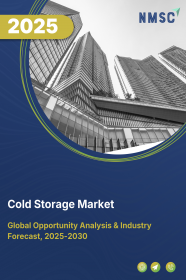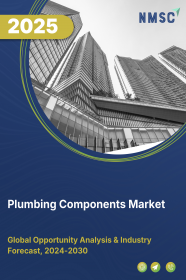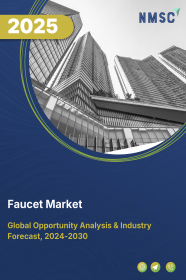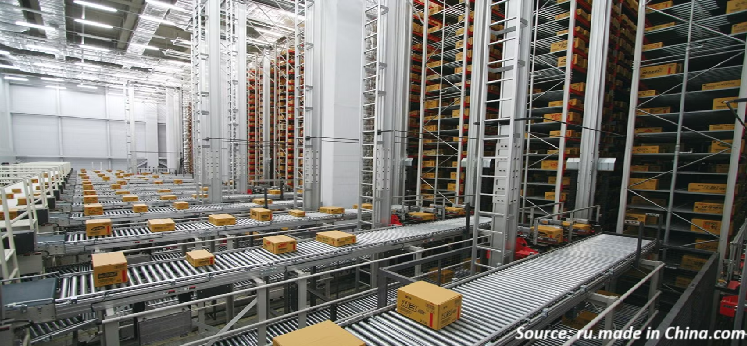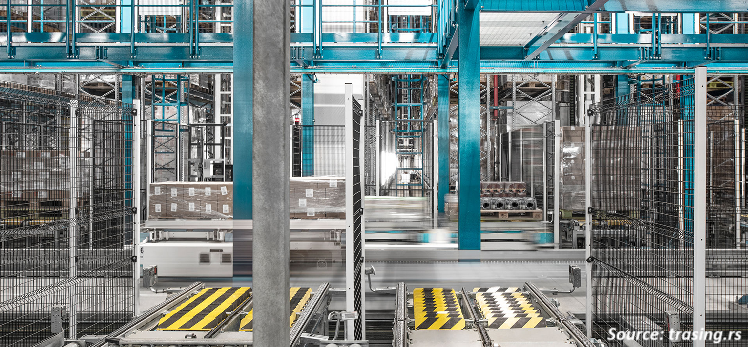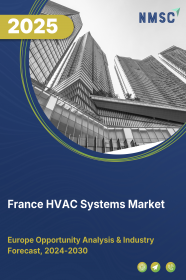
France HVAC Systems Market by Equipment (Cooling Equipment, Heating Equipment, and Ventilation), by Implementation Type (New Construction and Retrofit), and by End User (Residential, Commercial, and Industrial) - Opportunity Analysis and Industry Forecast, 2024– 2030
Industry: Construction & Manufacturing | Publish Date: 04-Apr-2025 | No of Pages: 152 | No. of Tables: 117 | No. of Figures: 62 | Format: PDF | Report Code : CM1926
US Tariff Impact on France HVAC Systems Market
Trump Tariffs Are Reshaping Global Business
Market Definition
The France HVAC System Market size was valued at USD 5.97 billion in 2023, and is predicted to reach USD 9.08 billion by 2030, at a CAGR of 5.6% from 2024 to 2030.
HVAC (Heating, Ventilation, and Air Conditioning) refers to the technology and systems used in buildings to regulate indoor environmental conditions such as temperature, humidity, and air quality to ensure comfort and safety for occupants. Heating systems provide warmth during colder months, ventilation systems circulate and replenish indoor air, and air conditioning systems cool and dehumidify indoor air during warmer months.
HVAC systems offer several advantages, including improved occupant comfort and health, increased energy efficiency leading to cost savings, better indoor air quality through filtration and ventilation, precise temperature control for enhanced productivity in commercial settings, and protection of building infrastructure from extreme weather conditions. Additionally, these systems can be designed to meet specific requirements, contributing to sustainability goals by reducing carbon emissions and promoting eco-friendly practices in building operations.
Rising Urbanization and Construction Trends Propels the Market Expansion
The growth trajectory of the HVAC industry is significantly influenced by urbanization and construction trends. Urban population growth triggers an uptick in demand for HVAC systems across diverse structures including residential, commercial, and industrial establishments such as apartments, office complexes, shopping centers, and factories.
Concurrently, there is a noticeable shift in construction practices towards sustainability and energy efficiency, driven by green building initiatives mandated by governments and propelled by environmental concerns. These initiatives impose stringent standards for HVAC systems in new constructions, thereby creating a market for eco-friendly solutions.
Moreover, the trend towards renovating and retrofitting existing buildings amplifies the need for HVAC upgrades, in line with contemporary energy-saving technologies. The integration of HVAC systems with building automation and smart technology further augments building performance and energy efficiency, underscoring the pivotal role played by urbanization and construction trends in driving the growth of the HVAC industry.
Environmental Concerns Drive Growth in the HVAC Systems Industry
The HVAC systems industry is witnessing notable growth driven by environmental concerns. With increased awareness of climate change, air pollution, and ozone depletion, there is growing pressure for sustainable practices and regulatory compliance. Governments globally are imposing regulations to reduce the environmental impact of HVAC systems, prompting manufacturers to invest in eco-friendly technologies.
Moreover, environmental considerations are pivotal in driving growth within the HVAC systems sector. Heightened awareness surrounding climate change, air pollution, and ozone depletion has spurred demand for sustainable practices and regulatory measures. Governments worldwide are implementing mandates to mitigate the environmental impact of HVAC systems, catalyzing the development and adoption of eco-conscious technologies.
Price Volatility of Raw Materials Restrains the Growth of the HVAC system Market
The surge in raw material expenses, fueled by inflation and supply chain disruptions, poses challenges to the manufacturing costs associated with HVAC systems. The heightened costs of fundamental raw materials such as steel, copper, and aluminum significantly elevate production expenses for HVAC manufacturers.
Consequently, small and mid-scale HVAC enterprises encounter margin constraints, affecting profitability and restricting investments in research and development. This, in turn, constrains market expansion.
IoT Integration Creates Ample Opportunities for the HVAC System Market
The integration of Internet of Things (IoT) technology introduces a significant market opportunity for the HVAC industry. This integration facilitates remote control capabilities, enhanced energy efficiency, and predictive maintenance solutions. By incorporating IoT devices and sensors into HVAC systems, users can remotely monitor and adjust settings, optimize energy consumption, and proactively address maintenance issues before they escalate.
This augmentation enhances user experience and comfort, reduces energy expenditures, and extends the operational lifespan of HVAC equipment. With mounting demand for buildings that surpass the efficiency of existing infrastructure, the implementation of IoT integration is anticipated to generate ample opportunities within the HVAC system market.
Competitive Landscape
The market players operating in the France HVAC System market include Honeywell International Inc., Daikin Industries Ltd., Gree Electric Appliances Inc., Johnson Controls International Plc., Panasonic Holdings Corporation, LG Electronics Inc, Carrier Global Corporation, Trane Technologies Plc., Mitsubishi Electric Corporation, Samsung Electronics Co., Ltd., Schneider Electric, Toshiba Corporation, Danfoss, Electrolux, AIREDALE INTERNATIONAL AIR CONDITIONING LTD. and others.
France HVAC System Market Key Segments
By Equipment
-
Cooling Equipment
-
Unitary Air Conditioners
-
Variable Refrigerant Flow Systems (VRF)
-
Chillers
-
Room Air Conditioners
-
Coolers
-
Cooling Towers
-
-
Heating Equipment
-
Heat Pumps
-
Furnaces
-
Unitary Heaters
-
Boilers
-
-
Ventilation
-
Air-handling Units (AHUs)
-
Air Filtration Systems
-
Ventilation Fans
-
HRVs & ERVs
-
Air Purification Systems
-
Others
-
By Implementation Type
-
New Construction
-
Retrofit
By End User
-
Residential
-
Commercial
-
Industrial
KEY PLAYERS
-
Honeywell International Inc.
-
Daikin Industries Ltd.
-
Gree Electric Appliances Inc.
-
Johnson Controls International Plc.
-
Panasonic Holdings Corporation
-
LG Electronics Inc
-
Carrier Global Corporation
-
Trane Technologies Plc.
-
Mitsubishi Electric Corporation
-
Samsung Electronics Co., Ltd.
-
Schneider Electric
-
Toshiba Corporation
-
Danfoss
-
Electrolux
-
AIREDALE INTERNATIONAL AIR CONDITIONING LTD.
REPORT SCOPE AND SEGMENTATION:
|
Parameters |
Details |
|
Market Size in 2023 |
USD 5.97 Billion |
|
Revenue Forecast in 2030 |
USD 9.08 Billion |
|
Growth Rate |
CAGR of 5.6% from 2024 to 2030 |
|
Analysis Period |
2023–2030 |
|
Base Year Considered |
2023 |
|
Forecast Period |
2024–2030 |
|
Market Size Estimation |
Billion (USD) |
|
Growth Factors |
|
|
Companies Profiled |
15 |
|
Market Share |
Available for 10 companies |
|
Customization Scope |
Free customization (equivalent up to 80 working hours of analysts) after purchase. Addition or alteration to country, regional, and segment scope. |
|
Pricing and Purchase Options |
Avail customized purchase options to meet your exact research needs. |

















 Speak to Our Analyst
Speak to Our Analyst



